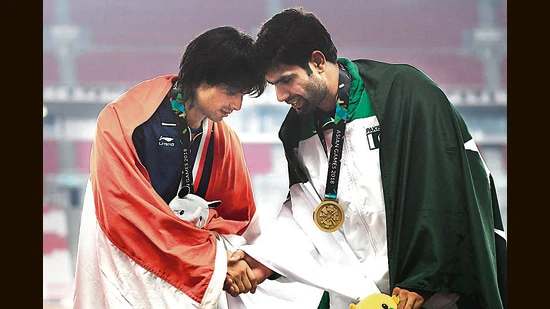It’s a story that’s been told a million times as an embodiment of the Sporting Spirit. In the 1936 Berlin Olympics, German Luz Long, in full view of Fuhrer Adolf Hitler, advised his great American rival Jesse Owens to take off a few centimetres short of the launching pad in the long jump final.
Luz Long was the embodiment of the so-called Aryan race whose fallacious superiority Hitler and his Third Reich sought to celebrate. Jesse Owens was a Black man born in a tenant farm in Alabama whose four gold medals (including the long jump; Luz Long had to settle for silver) punctured that theory on the world’s biggest sporting stage.
“You can melt down all the gold medals and cups I have, and they wouldn’t be a plating on the 24-carat friendship I felt for Luz Long at that moment,” Owens said later. Long, who died in 1943 while serving for the Wehrmacht in Sicily in World War 2, wrote this in his final letter to Owens: “…Someday find my [son] Karl, and tell him about his father. Tell him, Jesse, what times were like when we were not separated by war. I am saying – tell him how things can be between men on this earth.”
At its core, the sporting code exists on a higher plane than constructs such as international boundaries and emotions such as fervent nationalism. For sport, like art, must inform life rather than conform with it. It is sometimes obstructed by world wars, constricted by global pandemics, and derailed by political grandstanding, but its purpose is that of a higher order. And only those who play sport at the highest level, and those who truly love it, understand this.
Double Olympic medallist Neeraj Chopra, for instance, does. Which is why India’s greatest global sporting icon had swiftly shut down all attempts to malign his Pakistani rival Arshad Nadeem during the Tokyo final in 2021, and why his mother had praised the boy from across the border as her second son after he relegated Neeraj to a silver in Paris three years later.
But when Neeraj invited Arshad to the Neeraj Chopra Classic, a one-of-a-kind global athletics meet that was held in Bengaluru in July, the same adoring public that had put him on a pedestal viciously attacked him as sentiment bubbled over after the Pahalgam terror attack and the cross-border military campaigns that followed it. Things reached a point where Neeraj felt compelled to not just clarify the invitation from one Olympic champion to another but also explain his mother’s comment from the previous year, as an “innocent” woman’s “act of simplicity”.
Last week, these two talismans of track and field – Neeraj is from Khandra village in Haryana and Arshad is from Mian Channu village in Punjab Province roughly 500 km away – clashed once again at the World Championships in Tokyo. Their fates intertwined, the Pakistani finished 10th and the Indian 8th, way below their usual lofty standards.
WHAT’S THE GOAL, REALLY?
Their contest came soon after the Indian and Pakistan cricket teams faced off in Dubai in the T20 Asia Cup — a multilateral tournament in a neutral venue in which they were drawn in the same group; the two teams haven’t played on each other’s soil since 2013 — much to the chagrin of India’s choleric political landscape. Though one would’ve expected the so-called Hindu nationalist Centre to thwart the match, since it had chosen not to intervene, the mantle was picked up by the so-called left-liberal Opposition.
Some social commentators waxed eloquent about how, though they normally support the notion that sport and politics should be kept apart, this clash somehow felt different. Or, to get this straight, their disagreement with the powers that be was greater than their otherwise principled stand on the sanctity of sport.
As if to make up for the fact that the match was indeed played, once India won on a canter, captain Suryakumar Yadav refused to shake hands with his Pakistani counterpart Salman Agha. He then dedicated the victory to Sindoor, the military operation carried out by India in response to the Pahalgam attack. A few days later, when India beat Pakistan a second time in the same tournament, there were no handshakes again. The skipper’s actions were a rare closing of the loop on sport as a dividing rather than unifying force. A strange cocktail of soft and hard power, served on the menu as Sign of the Times.
The US and China used ping-pong diplomacy in the early 1970s to rekindle ties between the two countries. Multiple leaders from India and Pakistan employed cricket to try and mend the relationship — in 1987, Zia-ul-Haq visited Jaipur during a Test match; in 2004, Atal Bihari Vajpayee gave the nod to a bilateral Friendship Series after a 14-year break; and in 2011, Yusuf Raza Gilani and Manmohan Singh watched the India vs Pakistan World Cup semi-final at Mohali.
But the events of the last fortnight have taken us far away from the glorious idea of the Sporting Spirit, manifesting the Orwellian theory that sport is just “war minus the shooting”. Jesse Owens and Luz Long, both long gone from this earth, would not approve.
